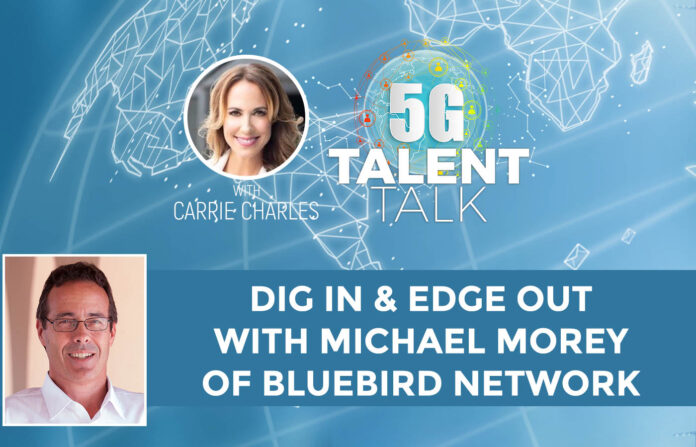Bluebird Network is a fiber services company that focuses on providing services to the commercial and carrier market in Missouri, Illinois, and the nine surrounding states. Heading this Midwestern provider is Michael Morey, once an aspiring volcanologist who found his way to telecommunications. After years of working for a telecom giant, Michael founded his own startup. He is responsible for starting and growing multiple companies as well. In this conversation, Michael shares a couple of his secret tricks and strategies that he used to help companies grow and generate revenue. He also talks about the company culture at Bluebird that is anchored on four key values. There is a lot more lessons to glean from this industry veteran. Join in and get some!
—
Watch the episode here
Listen to the podcast here
DIG IN & EDGE OUT With Michael Morey of Bluebird Network
I have a special guest for you. Joining me is Michael Morey. He is the President and CEO of Bluebird Network. Michael, thanks so much for coming to the show.
Thank you for having me, Carrie.
I’d love to learn a little bit about your background. How did you get started in this industry and how did you get into the seat that you’re in?
I get asked this question a lot. How did I become a CEO of a telecommunications company? For me, it seems apparent. When I was in junior high school, I wanted to be a volcanologist, go to Caltech, study volcanoes, and be a scientist. There’s a direct line between that and being the CEO of Bluebird, but it’s a little cloudy for most people, but volcanoes generate earthquakes. I then decided maybe I’d be a seismologist studying earthquakes, but then earthquakes knocked buildings down, so I said maybe I’d be an architect and design buildings that wouldn’t fall down.
I got a degree in Architecture from the University of Southern California. I encourage everybody whatever you’re doing, go out and do some internships in what you’re doing. I did some summer internships in Architecture and found out that the powerful people were not the architects, they were the developers. We would prepare for the developers to come and see our presentations on our buildings. I realized that was where the power was. I didn’t want to be working for those folks. I wanted to be higher than the architects. I decided I was going to go get my Master’s in Business Administration from USC as well because I was having a lot of fun there.
I did get a Master’s in Business Administration and graduated in 1982. For those of you who want to do the math, I’m an old guy. In 1982, interest rates were way higher than they are now and there was no development going on at all. I said, “If I can’t do what I want to do, I’ll work for whoever pays me the most money.” In 1982, AT&T was going through deregulation and the breakup of the monopoly Bell Company. I interviewed tons of people and made-up stories as to why it’ll be good for anybody. El Paso Natural Gas was my favorite one. They didn’t believe me but I always wanted to move to El Paso.
AT&T hired me and offered me the most money. I went through that whole thing and I learned in a big company, and then there were a lot of things that were going on between then and now. The internet got started, competitive local exchange carriers got started, and fibers started replacing cable and copper. There were a lot of people that were raising a lot of money and so I decided I was going to go raise some money. I went out and raised over $ 50 million from venture capital companies and ended up being the CEO of a startup company.
Once you start running companies, raising money, and talking to private equity people and advisors, it’s a short step and then the whole world opens up for you. I did a few companies and ended up interviewing and becoming the CEO o of Bluebird. That’s a condensed version of it, but shout out to all the volcanologists in the world.
Once you start running companies, raising money, and talking to private equity people and advisors, the whole world opens up for you.
That’s a very interesting journey. I always like to ask this question because there are people reading and thinking, “How do I move forward in my career? What are the steps that I take? What did he and she do? You have one of the most interesting stories I’ve ever heard. I didn’t know volcanologists existed, but I’ve learned a lot. There’s got to be some transferrable skills somewhere in there with telecom. Tell me the Bluebird story. Who is Bluebird Network? Who do you serve? All of it.
Bluebird Network is a fiber services company that focuses on providing services to the commercial and carrier market in the Midwest, Missouri, Illinois, and the nine surrounding states. We’re a Midwest-focused company. We do four things. We do fiber connectivity, connecting one place to another, whether it’s multiple locations in the State of Missouri, a fiber tower to their mobile telephone switching office, or an internet connection to a college facility. We have two data centers located in the Midwest that connect to that fiber network. We have cloud connectivity where we connect customers to the cloud. There’s a huge drive in the cloud right now, and then we have internet access across all of that.

We do two markets. One is the commercial market like education, banking, finance, universities, and governments, and then the other part is carriers. Every name you’ve ever heard in telecommunication buys from Bluebird in the Midwest. We help them connect and do things that maybe they didn’t do themselves.
An example is Spectrum Cable has locations in St. Louis, Hannibal, Columbia, Jefferson City, and down to the Lake of the Ozarks. They have lots of fiber in those areas, but they have no fiber connecting those locations. It’s way less expensive for them to buy those kinds of connections from us than it is for them to build their own. We have a huge market in providing connectivity to other carriers and wireless carriers. Every wireless carrier in the business buys from us. That pretty much sums up what we do.
There is so much happening with broadband right now. What is your perspective on the future of the internet? Any particular trends that you’re seeing that we need to be aware of?
The future of the internet is bright. It has been growing at a 30% annual rate in terms of demand for years. I don’t see that stopping anytime soon. It’s because of information. How much information do we generate, store, and access? How much is the bandwidth and applications we use to keep growing dramatically, whether it’s the Internet of Things, self-driving cars, or AI-type of applications? What could happen is unlimited. The demand side is going to keep growing like crazy.
A trend that kicked off as a result of COVID is that there was a move from the office to the home. The demand for those bits and bytes is now way more from the home than it ever used to be. At one point, everybody wanted to have movies, so it was downloading, but now people are working from home and you need two-way video and all that good stuff. You coupled that with the fact that the US government has put $65 billion into grants to put fiber to underserved homes throughout the US. That’s putting the huge trend in terms of this on fiber to the home.
Bluebird doesn’t do fiber to the home. We’re not a residential provider. In fact, I was at an investment conference and I asked somebody, “What are people saying about Bluebird?” They said, “Nothing because you don’t do residential.” That tells you how much the investment community is looking at residential. When you got $65 billion of free money, you’re going to push it down.
Bluebird does benefit tremendously from this marketplace because all those people that go to some small town like Princeton, Missouri or Hannibal Missouri and they build these deep fiber networks to the home, they have to connect to the rest of the world like that Spectrum example I gave. They have to figure out these rural areas where they’re building these local fiber networks. “How do I connect that to the rest of the world? How do I get internet? How do I get that huge bandwidth to those end users?” Since we are not a competitor to those people, we are a huge supplier of that growing fiber to the home market that’s out there. That’s probably the biggest trend in our industry right now.
When was Bluebird founded?
The year was 1999. We’ve been around a long time. We’ve done five acquisitions starting in 2014. We’ve grown to over 11,200 fiber miles. We have over 85,000 buildings that have near access to our network. We’re a huge presence in the Midwest. I like to say we’re the biggest fiber company that you’ve never heard of. The reason people haven’t heard of us is that we don’t do residential and mass-market television advertising. It’s mostly direct contact with very large organizations.

I was doing some reading about you. I was creeping you a little bit online, my apologies, but you have a history of helping companies grow and generating revenue. What strategies do you use to grow corporate value? Can you give us a couple of your secrets?
In my background, I didn’t talk much about this, but I worked for a company called Electric Lightwave which is a fiber and internet company. I started companies called NewTera and Voxitas. Bluebird itself has been growing like crazy. I also was involved with a company called NuVox. All of these companies have grown dramatically and sold for multiple hundreds of millions of dollars. There are two real keys in my opinion. One that is not as much of a key as everybody thinks it is and that is having money to invest.
I have spoken at conferences of entrepreneurs and everybody is walking around talking about their great idea. My comment is, “I can walk out in the hallway out there and find 50 great ideas, but who’s got the money? Where the money is what makes the difference.” Learning how to talk to and meet investors and people who have money, meaning venture capitalists, private equity people, and people who focus on seed investments. Ideas are great but think about how am I going to get the money for that. That is a super important thing. I’ve raised hundreds of millions of dollars over the years. Ultimately, if I didn’t have any of that money, I wouldn’t have been successful in anything I did.
The second thing is to have a great team to execute it. You’ve got to find the right people to take the money and execute the plan. The last thing is a great idea. Once you’ve got a company started and the money and you’re executing on that initial plan, then the creativity of how you can change and morph the company can come in. That’s probably where I would recommend people focus their attention. How do you meet these people who will invest in this stuff? That’s conferences. There are a lot of investment conferences, so go to conferences, meet some of these people, and ask them what they’re looking for. Before you jump in and start creating an idea, figure out where you get the money.
If you want to start a business, figure out where to get the money. Go to conferences, meet some investors, and ask them what they’re looking for before you start creating an idea.
I found out back in the years 1999 and 2000 that there was tons of money or venture capital chasing management teams. They couldn’t find enough management teams to invest in. What I did is I pulled together a management team, put together a business plan, and went and met with those investors. I had $50 million in six months. I didn’t start with the idea. I started with what is that money investing in? If your idea is in an area where there that people are not investing money, your idea is a waste of time. Go think of another idea. Go talk to somebody else, take somebody else’s idea and put it together with the money. That’s my two cents worth on that.
I love that. Speaking of teams, how do you build effective high-performing teams?
There are two parts to it. It’s who you know and having a broad network of people. I spend a lot of time meeting people. If somebody says that they know a great person, I always make a point of somehow meeting them. I was like, “I was talking to so-and-so. They said you were great at this. I’m not looking for anything right now, but we’re both in the same industry. We should get together.” The first step to putting together a great team is to know great people. To know great people, you need to be out there, introducing yourself, and offering to have lunch.
If you are not a CEO of a company, you can do this too. I’ve had people reach out to me, “Michael, I’ve heard that you’re great at this and stuff. I’m trying to get into this. I’m going to be down. I see that you’re at this conference. Do you have time to have breakfast with me?” I love that. I don’t always have time, but sometimes I do that. Meeting great people is the first thing.
The second thing is to understand what motivates people. A lot of times, people will look at resumes, “They did this and that.” I won’t even look at a resume with 1 to 3 years in each job. I put them on the side. I don’t do them. As long as they’ve committed to things over time, the real thing I like to do is why did they do what they did when they did it. “Michael, why did you take that job with AT&T the first time?” A terrible reason is because they paid me the most money. I had no commitment whatsoever. I was a terrible hire. Thank God, they talked me into it. I ended up staying at AT&T for thirteen years. My motivation was the worst motivation possible.
Thank God that I loved what I did. It turned out it was a great thing for me, but understanding why people are doing it when they do it, and then knowing a bunch of great people so you can compare them. You can say, “This person is doing things for the reasons that make sense for this job. I would get in the boat with them. I feel like we could get committed together.” Also, not being shy about asking people to join you. That’s my thoughts.
I love this conversation. Describe the company culture at Bluebird Network.
You asked me to describe the company culture, but another question that I give the same answer to is what makes Bluebird different than those other companies they’re looking at? A lot of times, when people say, “Why should I buy from Bluebird instead of AT&T, Verizon, or whoever?” “We’ve got great quality service and great prices. Our customer service is great.” They’ll go on and on with all these things, and everybody says the same stuff. When I answer that, I say, “It’s because of Bluebird and our corporate culture.”
I happen to be sitting in a conference room down in our Bluebird underground and I reached over because these are everywhere throughout the company. You can’t go anywhere without seeing the Bluebird values. We have four key values. 1) Wowing our customers, which means we meet or exceed our customer’s needs for both our internal and external customers. 2) We own it. We hold ourselves and each other accountable to do what’s right. 3) We adapt creatively. We quickly and creatively adapt to solve problems. 4) We care deeply. We care deeply about our customers, team members, community, and environment. If you care about these things, the way you do your job becomes a way that your customers love.
People love working with Bluebird. Our employees live these values. The super cool thing for me is these values existed at Bluebird when I was hired. It was way easier when you got a company that doesn’t think this way. It’s hard to move like trying to move a ship and change directions. These values weren’t publicized or documented and people didn’t realize them, but they were doing these things here at Bluebird. All I had to do was capture them, get everybody to buy in on them, document them, and continue to reinforce them throughout the company. Hopefully, that helps with the company culture.
Yes, it does. I was going to ask you where you are because it looks like you could be inside a volcano. Back to the volcano conversation. You must still like them.
I am sitting in one of Bluebird’s two data centers. This is called the Bluebird Underground. We’ve got all kinds of rock around. I’m about 150 feet below the ground. We have a huge area here where all of our data center equipment is housed. In the Midwest, that’s super important because tornadoes come through here like crazy. People put their critical data storage in data centers to protect it and to make sure it has power, cooling, and security and that people can’t break into it. In the Midwest, they do it to make sure that it doesn’t get destroyed by a tornado. We go underground and everything is protected from that.
In this area, there’s a town about 50 to 60 miles South of Springfield, Missouri, where I am right now called Joplin. One of our customers here in this data center is a hospital organization. They now have a new hospital in Joplin, but the hospital that was there about several years ago is no longer there because it was destroyed by a tornado. Inside that hospital, they had their data center, which was also destroyed.
Now, they are here in this data center as well as many of the companies within the 100 to 150-mile range of Springfield, Missouri, because they can make sure that their customer’s critical information is protected. If you lose your systems in a company nowadays, it could put you out of business. That’s a part of the business that we do. Thank you for asking.
Speaking of things changing, our workforce, workplace, and everything about how we work and where we work and the way that people think has changed drastically in the past few years. Leaders have become very confused. “How do I lead in today’s workforce? What do we do with the flexibility, in-office or out-of-office?” Everything is so different. What do people want and need for their mental health? It seems very challenging to be a leader at these times. What do leaders need to do differently to be successful?
At the highest level, we need to listen more and be more flexible. Those are the two things. More of those two things from what we were doing a few years is important. Bluebird has very highly skilled technical employees. We’re a high-tech company. Folks like that can go to any place in the world. We’re here in the Midwest and all those jobs were out on the East Coast and the West Coast. We had our own little bubble here. If somebody worked for you, they never leave.
Leaders need to listen more and be flexible.
Those folks always had these needs, but they’re more willing to express them and make job decisions based on the things that are important to them, whether it’s family, working from home, having more vacation time, having more quality time, not having to work sixteen hours a day, or things like that. At Bluebird, it’s been pretty easy.
Let’s talk about this work-from-home or work-from-the-office thing that everybody is talking about. If you want to work from home, at Bluebird, you can work from home. Do you want to work in the office at Bluebird? We let you work in the office. Do you want to work at home some and home office some? You can do that. If you want to change your mind and do it for a while and then not do it for a while, you can do whatever you want as long as you’re doing your work.
We’re not doing what some people are doing, where they’re monitoring how long they’re on their computer or how long they’re off their computer, and all that good stuff. We are not those Orwellian people looking over your shoulder. We set out clear objectives for what people need to achieve. If they’re achieving those, I’m happy. If they’re not achieving them, we’re going to move you out. It’s listening to what those needs are. We also do town halls.
We used to do all-hands meetings where we would bring the teams together and talk a lot. Now, we do those virtually, and so it becomes more of a one-way thing. What we’ve done is we’ve instituted town halls twice a year in each one of our offices where myself and at least one of the other executives will go into an office and break them up into groups of no more than fifteen. Some offices are significantly bigger than that so we’ll break it up into the 3 or 4 different sessions.
In those town halls, we sit around the table. I had one of these town halls at this table a few months ago and we do several things. One, we go over the employee surveys that we’ve done over the last quarter or the last half year. We show what they responded to. We show the concerns that come up or high fives that come out of that. We show them what the executive team is thinking about in terms of responding to this. We then ask around and say, “What do you guys think?” Are there things we should work on that we aren’t working on?”
We’re not so big that I can’t meet with every employee throughout the year at some point and these town halls are where I get to do it. They share with us what those things are. A lot of times, we include the people who have the ideas in the committees that are working on the solutions. Communication is a new art. It has become amped up in terms of its importance since people are not altogether. We focus on town hall meetings or all-hands meetings. Once a year, we try to bring the entire company together. Also, our onboarding has also been something that’s changed.
We used to have a loosey-goosey onboarding program, but when people work remotely, your onboarding program has to be far more formal. As part of our onboarding program, we have people meet virtually with all of the key people that impact their job. Normally, you meet them in the hallway and it wasn’t part of the old onboarding program. Now, these actual scheduled get-to-know-you meetings are part of their onboarding. You have to talk to these 25 people for half-hour get-to-know-each-other sessions. I’ve hit most of the key things that we have focused on to change.
That’s very smart. What are some exciting projects you have lined up for 2023? What’s on the agenda?
It’s more the same. We’re digging in and edging out which is our mission. It is to build deeper in fiber and get more connected to the communities that we are already serving and edging out into more communities throughout the Midwest. We keep building and doing about 500 miles of fiber every year. We keep adding on about 5,000 to 9,000 near-connected buildings. We’re going to keep doing that.

Every once in a while, we’ll buy a company. We bought Missouri Telecom, which is a telecommunication provider in Southwest, Missouri. In 2022, we bought the Quad Cities Data Center which is a data center in the Northeast part of our area. A few years ago, we bought a company called Illinois Network Alliance, which is fiber in the Southern part of Illinois. Also, we bought a thing called Uniti Midwest. We try to find something else to add on, some kind of bolt-in acquisition. I don’t know if we’re going to do one this 2023. If we do, I don’t know when it’s going to be, but we’ll keep building, digging in, and edging out. We might add another company here or there. That’s about what we’re doing.
I’m sure that people reading this are thinking, “How do I get a job with Bluebird Network? It’s a wonderful place to work.” In general, how can we find out more about Bluebird Network?
Go to our website, which is BluebirdNetwork.com. We do have a career section there. If you’re looking for a job, we do post them, so go out there. If you know somebody that is working at Bluebird, reach out and contact them, but going to our website is the best way to find us.
Michael, this has been incredible. I’ve learned so much. Thank you for coming to the show.
Thank you, Carrie, for having me. Have a great week.
You too. Take care.
Important Links
- Bluebird Network
- Michael Morey – LinkedIn
About Michael Morey
 Michael Morey has been serving as President and CEO of Bluebird Network since 2012. With more than 40 years of telecommunications experience, Morey has served as President & CEO of Voxitas, Senior Vice President at NuVox, Regional Vice President of Electric Lightwave, Inc. and held various management positions within his 13 years at AT&T.
Michael Morey has been serving as President and CEO of Bluebird Network since 2012. With more than 40 years of telecommunications experience, Morey has served as President & CEO of Voxitas, Senior Vice President at NuVox, Regional Vice President of Electric Lightwave, Inc. and held various management positions within his 13 years at AT&T.
During his tenure at Bluebird Network, the company has more than tripled in size and was named as one of the fastest growing companies in Missouri in 2015. Morey’s experience and strong management skills proved successful when Bluebird Network received INC 5000 in 2013, 2014, 2016 and 2017 as one of the fastest growing private companies nationally. Voxitas also received INC 5000 recognition in 2007, 2008, and 2009. Additionally, Morey has been recognized as a titan of the telecom industry by winning the Titan 100 designation in 2022 and 2023.
Morey earned a BS and MBA while attending the University of Southern California.

